#eugenius iv
Photo



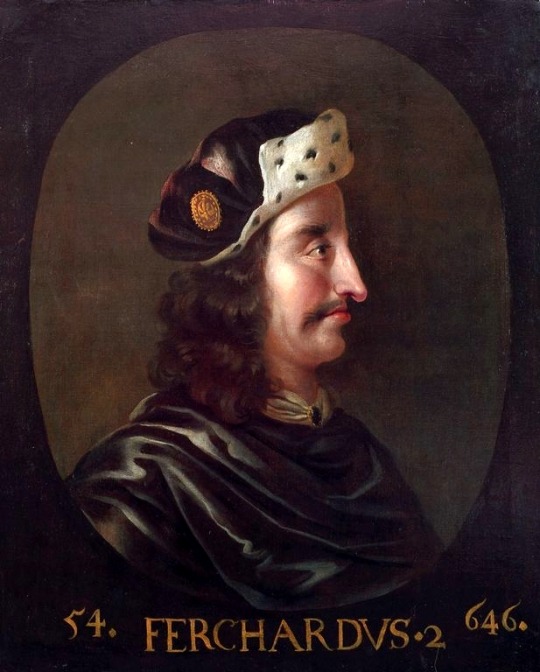
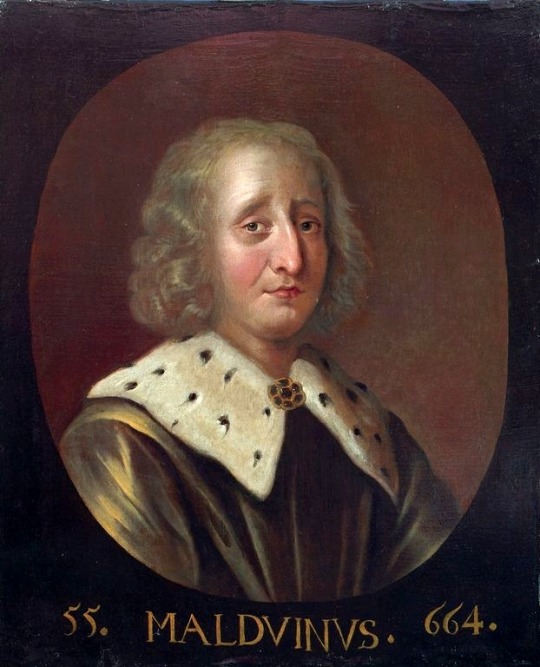

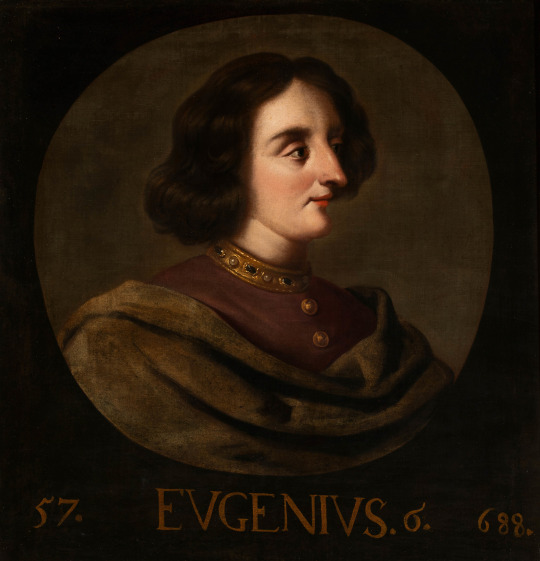
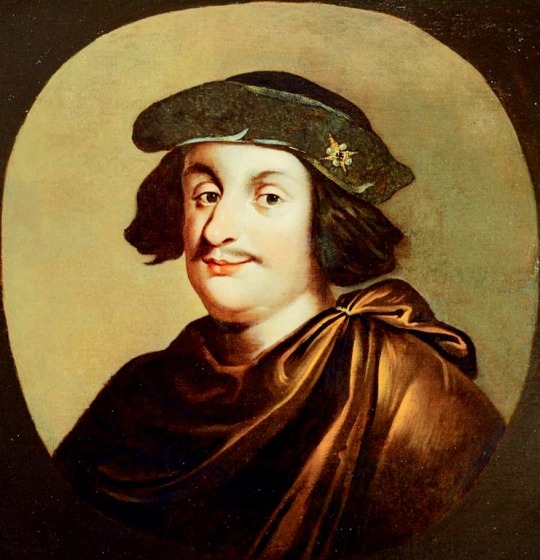

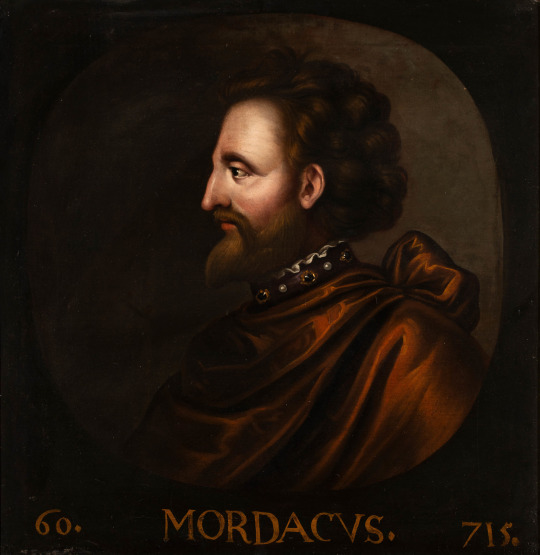
Legendary Kings of Scotland.
51. Eugenius IV (Eochaid Buide, King of Dál Riata from around 608 until 629).
52. Fearchair I (Ferchar mac Connaid, King of Dál Riata from about 642 until 650).
53. Donaldus IV (Domnall Brecc or Donald the Freckled, King of Dál Riata, from about 629 until 642).
54. Ferchardus II (Ferchar Fota or Ferchar the Tall, probably King of the Cenél Loairn of Dál Riata, and perhaps of all Dál Riata)
55. Maldvinus.
56. Eugenius V.
57. Eugenius VI.
58. Amberkelethus (Ainbcellach mac Ferchair, King of the Cenél Loairn of Dál Riata, and perhaps of all Dál Riata, from 697 until 698, when he was deposed and exiled to Ireland).
59. Eugenius VII (Likely duplicates Eugenius VI; King of Dál Riata from 726 until 733).
60. Mordacus (Muiredach mac Ainbcellaig), King of the Cenél Loairn, and of Dál Riata, from about 733 until 736.
#kingdom of scotland#list of scottish kings#list of monarchs of scotland#rerum scoticarum historia#kingdom of dalriada#kings of scotland#kings of dalriada#scottish dna#eugenius iv#eugenius v#eugenius vi#eugenius vii#ferchardus ii#maldvinus#amberkelethus#mordacus#donaldus iv#king donald#jacob jacobsz de wet ii#richard cooper#george buchanan#list of monarchs
10 notes
·
View notes
Text
Holidays 8.23
Holidays
Asian Corpsetwt Day [Every 23rd]
Battle of Kursk Day (Russia)
Black Ribbon Day (Baltic states)
Daffodil Day [also 4th Friday]
European Day of Remembrance for Victims of Stalinism and Nazism (EU)
Find Your Inner Nerd Day
Flag Day (Ukraine)
Gai Jatra (Cow Festival; Kathmandu Valley, Nepal)
Goldfinch Day
Hashtag Day
Health Unit Coordinator Day
Hebron Massacre Anniversary (Israel)
Hug Your Sweetheart Day
International Blind Dog Day
International Day For the Remembrance of the Slave Trade and its Abolition (UN)
Internaut Day
Kharkiv City Day (Ukraine)
Liberation from Fascist Occupation Day (Romania)
National Cheap Flight Day
National Levi Day
National Physicians Day (Iran)
National Plumber's Day
National Sneak Off to the Beach Day
One-Way Street Day
Permanent Press Day
Purple Poppy Day (UK)
Ride the Wind Day
Sacco-Vanzetti Memorial Day
Schueberfouer Shepherd’s Fair begins (Luxembourg)
Singin’ in the Rain Day
Slavery Remembrance Day
Tuberose Day (French Republic)
Umhlanga Day (Eswatini, f.k.a. Swaziland)
Valentino Day
William Wallace Day (Scotland)
Food & Drink Celebrations
Buttered Corn Day
Cuban Sandwich Day
National Spongecake Day
Swedish Meatball Day
World Vada Pad Day (Maharashtra, India)
4th Wednesday in August
La Tomatina (World’s Biggest Food Fight; Buñol, Spain) [4th Wednesday]
Independence Days
Aerlig (Declared, 2001) [unrecognized]
Feast Days
Alexander Calder (Artology)
Appollinaris Sidnonius, Bishop of Clermont (Christian; Saint)
Appreciate What You’ve Got Day (Pastafarian)
Ascelina (Christian; Saint)
Asterius, Claudius, Domnina, Neon, and Theonilla (Christian; Martyrs)
Chǔshǔ begins (China) [Thru 9.7]
Day of Hephaestos (Pagan)
Day of Nemesea (Old Roman Goddess Nemesis, defender of the relics & memory of the dead from insults)
Dollond (Positivist; Saint)
Éogan of Ardstraw (Christian; Saint)
Eugenius of Ireland (Christian; Saint)
Gaura Parba (Women’s Festival to Goddess Gauri; Nepal)
Great Feast of the Netjeru (All Gods/Goddesses; Ancient Egypt)
Hammer Fraggle (Muppetism)
Janmashtami (Lord Krishna Nativity; Hindu)
Justinian the Hermit (Christian; Saint)
Kirvis (Harvest Festival; Lithuania)
Lupus (a.k.a. Luppus) of Novae (Christian; Saint)
Nemeseia (Ancient Greece)
Nuclear Accident Day (Church of the SubGenius)
Philip Benitius (Christian; Saint)
Quiriacus and companions, of Ostia (Christian; Saint)
Rose of Lima (Christian; Saint)
Theonas, Archbishop of Alexandria (Christian; Saint)
Tydfil (Christian; Saint)
Vertumnalia (Old Roman God of the Change of Seasons)
Vulcanalia (Ancient Roman festival to Vulcan)
Zacchaeus of Jerusalem (Christian; Saint)
Lucky & Unlucky Days
Tomobiki (友引 Japan) [Good luck all day, except at noon.]
Premieres
Alice Adams (Film; 1935)
Angel Has Fallen (Film; 2019)
Animal Crackers (Film; 1930)
Barton Fink (Film; 1991)
Better Off Dead (Film; 1985)
The Big Sleep (Film; 1946)
Cherry Pink and Apple Blossom White, recorded Perez Prado (Song; 1954)
DC Super Hero Girls: Hero of the Year (WB Animated Film; 2016)
The Death of Superman (WB Animated Film; 2018)
Drinking Buddies (Film; 2013)
Freeway (Film; 1996)
The Girl at the Ironing Board (WB MM Cartoon; 1934)
Going! Going! Gosh! (WB MM Cartoon; 1952)
Grace, by Jeff Buckley (Album; 1994)
Henry IV, Part 2, by William Shakespeare (Play; 1600)
Knighty Knight Bugs (WB LT Cartoon; 1958)
Lover, by Taylor Swift (Album; 2019)
She Loves You, by The Beatles (UK Song; 1963)
She’s the One (Film; 1996)
Teen Wolf (Film; 1985)
The Sun Also Rises (Film; 1957)
Superior Duck (WB Cartoon; 1996)
Superman: Man of Tomorrow (WB Animated Film; 2020)
That ’70s Show (TV Series; 1998)
Tom and Jerry and the Wizard of Oz (WB Animated Film; 2011)
The World’s End (Film; 2013)
Today’s Name Days
Isolde, Philipp, Rosa, Zachäus (Austria)
Rozalija, Ruža, Ružica (Croatia)
Sandra (Czech Republic)
Zakæus (Denmark)
Signe, Singe (Estonia)
Signe, Varma (Finland)
Rose (France)
Isolde, Rosa, Zachäus (Germany)
Bence (Hungary)
Fabrizio, Maria, Regina (Italy)
Benjamins, Ralfs, Spriditis, Vitālijs (Latvia)
Girmantas, Pilypas, Tautgailė (Lithuania)
Signe, Signy (Norway)
Apolinary, Benicjusz, Filip, Laurenty, Sulirad, Walerian, Waleriana, Zacheusz (Poland)
Filip (Slovakia)
Rosa (Spain)
Signe, Signhild (Sweden)
Eugene, Eugenia, Geena, Gena, Gene, Genie, Gina, Jina, River, Zacchaeus, Zaccheus (USA)
Today is Also…
Day of Year: Day 235 of 2024; 130 days remaining in the year
ISO: Day 3 of week 34 of 2023
Celtic Tree Calendar: Coll (Hazel) [Day 16 of 28]
Chinese: Month 7 (Geng-Shen), Day 8 (Gui-Chou)
Chinese Year of the: Rabbit 4721 (until February 10, 2024)
Hebrew: 6 Elul 5783
Islamic: 6 Safar 1445
J Cal: 25 Hasa; Foursday [25 of 30]
Julian: 10 August 2023
Moon: 43%: Waxing Crescent
Positivist: 11 Gutenberg (9th Month) [Dollond]
Runic Half Month: As (Gods) [Day 11 of 15]
Season: Summer (Day 63 of 94)
Zodiac: Virgo (Day 2 of 32)
0 notes
Text
Holidays 8.23
Holidays
Asian Corpsetwt Day [Every 23rd]
Battle of Kursk Day (Russia)
Black Ribbon Day (Baltic states)
Daffodil Day [also 4th Friday]
European Day of Remembrance for Victims of Stalinism and Nazism (EU)
Find Your Inner Nerd Day
Flag Day (Ukraine)
Gai Jatra (Cow Festival; Kathmandu Valley, Nepal)
Goldfinch Day
Hashtag Day
Health Unit Coordinator Day
Hebron Massacre Anniversary (Israel)
Hug Your Sweetheart Day
International Blind Dog Day
International Day For the Remembrance of the Slave Trade and its Abolition (UN)
Internaut Day
Kharkiv City Day (Ukraine)
Liberation from Fascist Occupation Day (Romania)
National Cheap Flight Day
National Levi Day
National Physicians Day (Iran)
National Plumber's Day
National Sneak Off to the Beach Day
One-Way Street Day
Permanent Press Day
Purple Poppy Day (UK)
Ride the Wind Day
Sacco-Vanzetti Memorial Day
Schueberfouer Shepherd’s Fair begins (Luxembourg)
Singin’ in the Rain Day
Slavery Remembrance Day
Tuberose Day (French Republic)
Umhlanga Day (Eswatini, f.k.a. Swaziland)
Valentino Day
William Wallace Day (Scotland)
Food & Drink Celebrations
Buttered Corn Day
Cuban Sandwich Day
National Spongecake Day
Swedish Meatball Day
World Vada Pad Day (Maharashtra, India)
4th Wednesday in August
La Tomatina (World’s Biggest Food Fight; Buñol, Spain) [4th Wednesday]
Independence Days
Aerlig (Declared, 2001) [unrecognized]
Feast Days
Alexander Calder (Artology)
Appollinaris Sidnonius, Bishop of Clermont (Christian; Saint)
Appreciate What You’ve Got Day (Pastafarian)
Ascelina (Christian; Saint)
Asterius, Claudius, Domnina, Neon, and Theonilla (Christian; Martyrs)
Chǔshǔ begins (China) [Thru 9.7]
Day of Hephaestos (Pagan)
Day of Nemesea (Old Roman Goddess Nemesis, defender of the relics & memory of the dead from insults)
Dollond (Positivist; Saint)
Éogan of Ardstraw (Christian; Saint)
Eugenius of Ireland (Christian; Saint)
Gaura Parba (Women’s Festival to Goddess Gauri; Nepal)
Great Feast of the Netjeru (All Gods/Goddesses; Ancient Egypt)
Hammer Fraggle (Muppetism)
Janmashtami (Lord Krishna Nativity; Hindu)
Justinian the Hermit (Christian; Saint)
Kirvis (Harvest Festival; Lithuania)
Lupus (a.k.a. Luppus) of Novae (Christian; Saint)
Nemeseia (Ancient Greece)
Nuclear Accident Day (Church of the SubGenius)
Philip Benitius (Christian; Saint)
Quiriacus and companions, of Ostia (Christian; Saint)
Rose of Lima (Christian; Saint)
Theonas, Archbishop of Alexandria (Christian; Saint)
Tydfil (Christian; Saint)
Vertumnalia (Old Roman God of the Change of Seasons)
Vulcanalia (Ancient Roman festival to Vulcan)
Zacchaeus of Jerusalem (Christian; Saint)
Lucky & Unlucky Days
Tomobiki (友引 Japan) [Good luck all day, except at noon.]
Premieres
Alice Adams (Film; 1935)
Angel Has Fallen (Film; 2019)
Animal Crackers (Film; 1930)
Barton Fink (Film; 1991)
Better Off Dead (Film; 1985)
The Big Sleep (Film; 1946)
Cherry Pink and Apple Blossom White, recorded Perez Prado (Song; 1954)
DC Super Hero Girls: Hero of the Year (WB Animated Film; 2016)
The Death of Superman (WB Animated Film; 2018)
Drinking Buddies (Film; 2013)
Freeway (Film; 1996)
The Girl at the Ironing Board (WB MM Cartoon; 1934)
Going! Going! Gosh! (WB MM Cartoon; 1952)
Grace, by Jeff Buckley (Album; 1994)
Henry IV, Part 2, by William Shakespeare (Play; 1600)
Knighty Knight Bugs (WB LT Cartoon; 1958)
Lover, by Taylor Swift (Album; 2019)
She Loves You, by The Beatles (UK Song; 1963)
She’s the One (Film; 1996)
Teen Wolf (Film; 1985)
The Sun Also Rises (Film; 1957)
Superior Duck (WB Cartoon; 1996)
Superman: Man of Tomorrow (WB Animated Film; 2020)
That ’70s Show (TV Series; 1998)
Tom and Jerry and the Wizard of Oz (WB Animated Film; 2011)
The World’s End (Film; 2013)
Today’s Name Days
Isolde, Philipp, Rosa, Zachäus (Austria)
Rozalija, Ruža, Ružica (Croatia)
Sandra (Czech Republic)
Zakæus (Denmark)
Signe, Singe (Estonia)
Signe, Varma (Finland)
Rose (France)
Isolde, Rosa, Zachäus (Germany)
Bence (Hungary)
Fabrizio, Maria, Regina (Italy)
Benjamins, Ralfs, Spriditis, Vitālijs (Latvia)
Girmantas, Pilypas, Tautgailė (Lithuania)
Signe, Signy (Norway)
Apolinary, Benicjusz, Filip, Laurenty, Sulirad, Walerian, Waleriana, Zacheusz (Poland)
Filip (Slovakia)
Rosa (Spain)
Signe, Signhild (Sweden)
Eugene, Eugenia, Geena, Gena, Gene, Genie, Gina, Jina, River, Zacchaeus, Zaccheus (USA)
Today is Also…
Day of Year: Day 235 of 2024; 130 days remaining in the year
ISO: Day 3 of week 34 of 2023
Celtic Tree Calendar: Coll (Hazel) [Day 16 of 28]
Chinese: Month 7 (Geng-Shen), Day 8 (Gui-Chou)
Chinese Year of the: Rabbit 4721 (until February 10, 2024)
Hebrew: 6 Elul 5783
Islamic: 6 Safar 1445
J Cal: 25 Hasa; Foursday [25 of 30]
Julian: 10 August 2023
Moon: 43%: Waxing Crescent
Positivist: 11 Gutenberg (9th Month) [Dollond]
Runic Half Month: As (Gods) [Day 11 of 15]
Season: Summer (Day 63 of 94)
Zodiac: Virgo (Day 2 of 32)
0 notes
Text
Also man, one of the few times they elected a Venetian pope
Poor Eugenius IV was like “maybe pay your taxes and stop embezelling state funds?”
Orsinni, Colonna, Frangipane families: Shan’t.
#jokes on them though they got his nephew as pope within twenty years of Eugenius’ death#early modern shit posting#which should also be my tag anytime I talk about Machiavelli#my favourite early modern hot mess#patron Saint of sarcastic chaotically bisexual civil servants#so my patron Saint#Machiavelli: I don’t believe in God but I’m into this sainthood#Machiavelli’s brother in law: for the last time Nico you can’t just go around announcing that you don’t believe in god. think of your family#machiavelli: FINE. i guess.#early modern period#history
1 note
·
View note
Text
FORD ZETEK

Pous Eugenius IV,2 net soos Andrea die Abt, hoof van die Koptiese afvaardiging. Maar terwyl die Kopte 'n ooreenkoms van unie met die Rooms-Katolieke Kerk onderteken het, het die Ethiopiërs geblyk van Jeruslaem af te kom en 'n cial te wees. Die besoek aan Italië van albei groepe is opgeteken deur Antonio Averlino, bekend as Filarete, in 'n dubbelpaneel op die bronsdeure van die Basiliek van St. Peter in Rome, voltooi in 1445 (g. 43).3 Word op die deure verteenwoordig. van die belangrikste kerk in die Westerse Christendom was 'n beduidende eer, wat 'n belangrike daad van insluiting uitmaak.
Tema: die Boere Swana diaspora van Egipte Ontwikkeling en bewyse.
Thomo: grootste "gevaar om oor Europese xenofobie te praat"
Liberté, Égalité, Fraternité.
0 notes
Text
#FolkloreThursday - St Conan
Feast of St Conan, monk of Iona. He is supposed to have been tutor to the children of "King Eugenius IV" (who doesn't seem to have existed). Kilconan in Perthshire is named after him and he has a holy well at Dalmally, Argyll. Possibly a duplicate of the saint of the same name who was Bishop of Man in the C7.
0 notes
Text
Miele w 1614 bedienungsanleitung target
MIELE W 1614 BEDIENUNGSANLEITUNG TARGET >> DOWNLOAD LINK
vk.cc/c7jKeU
MIELE W 1614 BEDIENUNGSANLEITUNG TARGET >> READ ONLINE
bit.do/fSmfG
Kroeber-Riel, W., & Weinberg, P. (2008). Konsumentenverhalten, München. Weinberg, P. (1992). Erlebnismarketing, München. Eine Einführung in das Konzept der1355 bedienungsanleitung deutsch Miele w 1614 bedienungsanleitung target Bedienungsanleitung nespresso u machine Mebus wireless weather station. 285, Wireless, B07KYR9F24, 761345116572, Antec VP700P Plus EC alimentatore per computer 700 W ATX Nero, 1, 60.05. 286, Electronics, Headphones, B07N7ZNDPW .de/de/product/_miele-tcr-860-wp-d-lw-eco-steam-wifi-xl-2466560.html daily daily mediamarkt.de/de/product/_epson-eb-w-12-1481754.html Nuntius Antonio Albergati (1610 Mai-1614 Mai). Stieber Joachim W. Pope Eugenius IV, the Council of Basel and the Secular Miele Michele.
, , , , .
0 notes
Photo
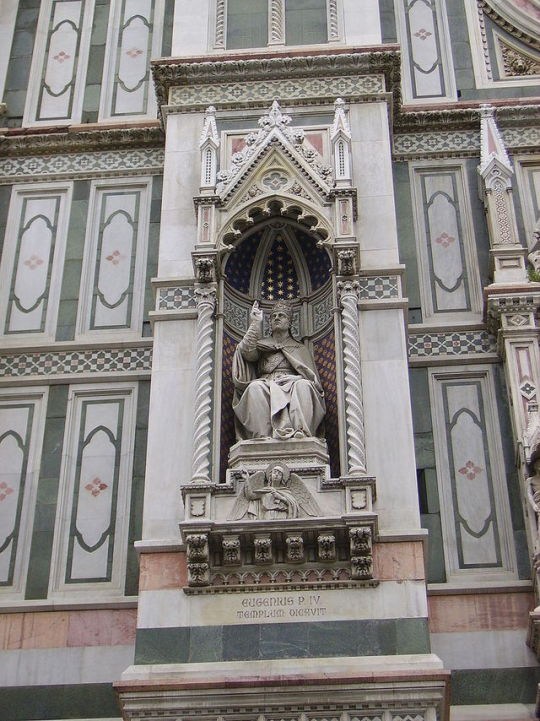

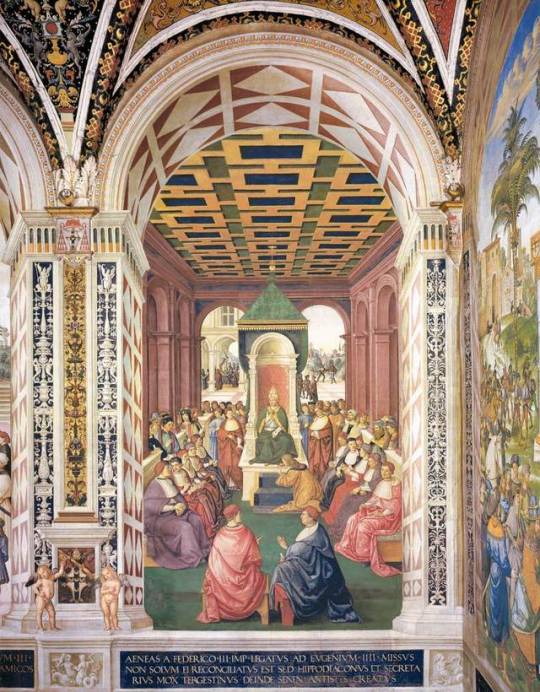
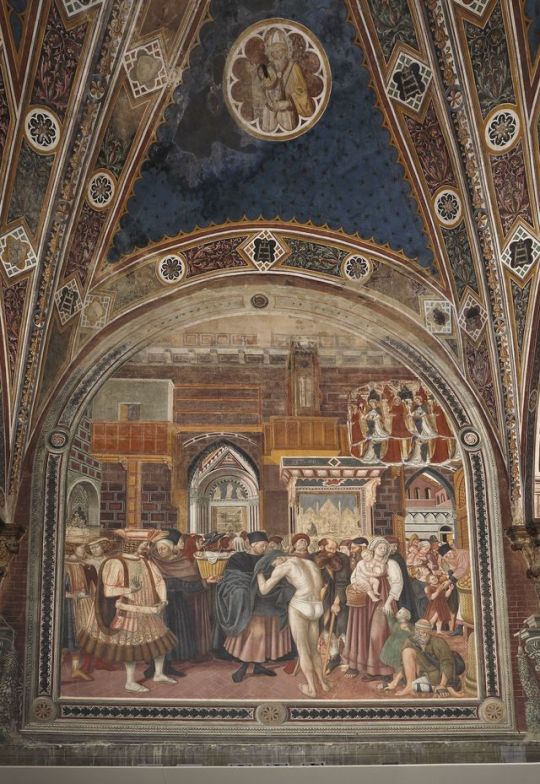
By Maggie Bell
Pope Eugenius IV (born Gabriele Condulmer in 1383) died on February 23, 1447. At the age of 24, Gabriele became the Bishop of Siena, which the local officials loudly resisted, causing him to eventually resign the post. He was later appointed the Cardinal Priest of Santa Maria in Trastevere by Pope Martin V, who he succeeded in 1431, taking the name Eugenius.
Eugenius's papacy was marked with contention and political struggle, coming to a head when the prelates at the Council of Basel denounced the pope as a heretic after he formed a rival council in Ferrara. This council was later moved to Florence due to an outbreak of the plague, and it was there that Eugenius formed an uneasy but politically advantageous truce with the Eastern Orthodox Church.
Eugenius IV is represented frequently in art from the mid-fifteenth centuries. Even in Siena, where he was initially the dislike foreign Bishop, as pope he was welcomed into the city on his was back from Florence in 1443. It is hypothesized that the monumental frescoes in the central ward of the Hospital of Santa Maria della Scala were painted to showcase the hospital's good works in hopes of inspiring papal generosity.
Further reading:
Eugenio IV, papa, Treccani online. http://www.treccani.it/enciclopedia/eugenio-iv-papa/
Pertici, Petra. "Gli affreschi del Pellegrinaio: un osservatorio d'eccezione per i grandi temi della storia italaina del Quattrocento" in Il Pellegrinaio dell'Ospedale di Santa Maria della Scala (Arcidosso: Effigi, 2014).
Pope Eugenius IV on the Florence Cathedral
Portrait of Eugenius IV after Jean Fouquet, 1568
Pinturicchio, Homage to Pope Eugenius IV in the Name of Emperor Frederick III, Piccolomini Library, Siena, 1502-1508.
Domenico di Bartolo, The Distribution of Alms, Hospital of Santa Maria della Scala, Siena, 1441.
#italy#history#art#art history#fifteenth century#popes#florence#siena#eugenius iv#political history#council of florence
28 notes
·
View notes
Text
The neverending story of Leo's manuscripts
The neverending story of Leo’s manuscripts

I recently asked a senior academic who’s been helping me out to order two library catalogues through interlibrary loans for me (working at the uOttawa library gives me some privileges as an alumnus, but not ILLs). I remarked that I keep finding more manuscripts of Leo’s letters.
His response was that it may never end.
My ever-growing list of Leo manuscripts is the result of new catalogues with…
View On WordPress
#angelo capranica#council of chalcedon#council of florence#eugenius iv#leo the great#manuscripts#nicholas v#paul ii#rusticus
0 notes
Text
That one time in the middle ages when peoe tried to reinstate the Roman Republic and Peter Abelard's buddy joined them:
"Two years earlier the renovatio senatus (“renewal of the Senate”), seeking independence from ecclesiastical control, had expelled Innocent and the cardinals, revived the ancient senate, and proclaimed Rome a republic.
Eugenius sent Arnold to Rome on a penitential pilgrimage. He soon allied himself with the insurgents and resumed his preaching against the Pope and cardinals. He was excommunicated in July 1148. Arnold’s agitation for ecclesiastical reform vitalized the revolt against the Pope as temporal ruler, and he soon controlled the Romans. He also worked to consolidate the citizens’ newly won independence.
Pope Adrian IV placed Rome under interdict in 1155 and asked the citizens to surrender Arnold. The Senate submitted, the republic collapsed, and the papal government was restored. Arnold, who had fled, was captured by the forces of the Holy Roman emperor Frederick I Barbarossa, then visiting Rome for his imperial coronation. Arnold was tried by an ecclesiastical tribunal, condemned for heresy, and transferred to the Emperor for execution. He was hanged, his body burned, and his ashes cast into the Tiber River."
4 notes
·
View notes
Text
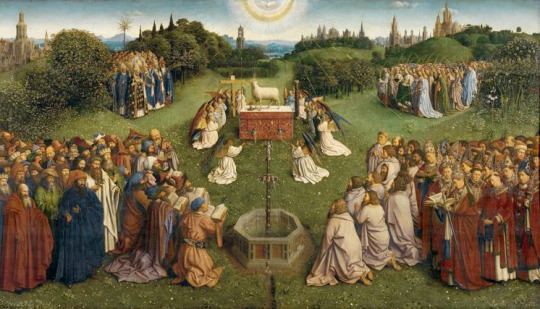
Lam Gods, by the brothers Van Eyck
more information about the mysterious Jan Van Eyck- new in history (7/?)
While Jan Van Eyck might be one of the most renowned painters of his day, most of his private life remains a mystery. In only a few contemporary documents, Jan Van Eyck is mentioned. Because there were more people with the name “Jan Van Eyck” in the Low Countries in the first half of the fifteenth century, biographical research on one of the greatest painters of what is now known as the Flemish Primitives or Vlaamse Primitieven, is mostly based on speculations or assumptions. Most of the information we have about him, dates from after his death.
Until now, because new historical research shows us how Jan Van Eyck wrote on the 26th of March 1441, half a year before his death, to pope Eugenius IV. The pope later granted Jan van Eyck and Margaretha, his wife, a perpetual confessional letter; a “penitentiaries maior”. The letter also gives an insight in his potential place of birth. Until now, it is not clear where or when Jan van Eyck was born. This new archival source puts for sure that he was born in the diocese of Liège (making him not flemish at all, at least not in the historical sense but yeah). What this letter also shows is the mentality of Jan Van Eyck. Most painters of his time didn’t write to the pope; in doing so, Jan Van Eyck tried to mimic his rich clients of the high clergy and bourgeoisie. What is even more intriguing is that this privilege was also granted to him. It tells us a lot about his status.
Research: Callewier, Hendrik. “A New Document on Jan Van Eyck: His Request for a Confessional Letter in the Vatican Archives.” Simiolus -Bussum, vol. 43, no. 1/2, 2021, pp. 16–25.
#new in history#history#historical research#jan van eyck#fifteenth century#female artists#middle ages#flemish primitives#vlaamse primitieven#lam gods
31 notes
·
View notes
Text
Saints&Reading: Fri., Apr. 9, 2021
March 27/April 9
The Holy Martyre Matrona of Soluneia (4th c.)
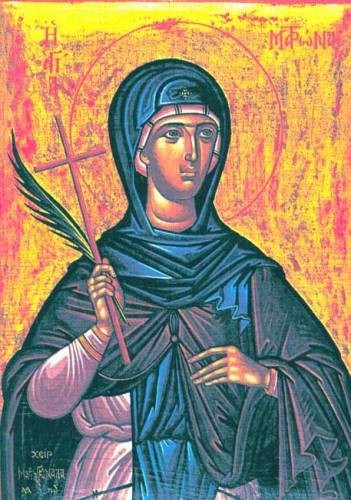
The Holy Martyress Matrona of Soluneia (Thessalonika) suffered in the III or IV Century. She was a slave of the Jewish Pautila, wife of one of the military-commanders of Soluneia. Pautila forced her slave into apostasy and conversion to Judaism, but Saint Matrona, having her faith in Christ since her youthful years, still firmly believed in Christ and went to church secretly unbeknownst to her vengeful mistress.
One time Pautila, having learned that Blessed Matrona had been in church, asked: "Why hast thou not come to our synagogue, but instead did walk to the Christian church?" Saint Matrona boldly answered: "Because in the Christian church God is present, but He is gone away from the Jewish synagogue". Pautila went into a rage and mercilessly beat Saint Matrona, and having tied her shut her into a dark closet. In the morning Pautila discovered, that Saint Matrona had been freed of her bonds by an unknown Power. In a rage Pautila beat the martyress almost to death, then tied her again even more tightly and locked her in the closet, having sealed the door, so that no one might offer help to the sufferer. The holy martyre was there over the course of four days without food or water, and when Pautila opened the door, she again beheld Saint Matrona out of her bonds standing at prayer. In a fierce rage Pautila began to beat the holy martyress with a stout cane and, when the saint was barely breathing, the fierce woman locked her in the room, wherein also the Martyre Matrona gave up her spirit to God.
The body of the holy martyress was thrown from the city wall, by order of Pautila. Christians took up the much-suffered body of the holy martyre and reverently gave it over to burial. And later on, the bishop of Soluneia, Alexander, built a church in the name of the holy martyre, in which they put her holy relics, glorified by miracles.
The judgement of God soon overtook the tormentor Pautila at that very place, where the body of Saint Matrona had been throw from the high wall, – she herself stumbled, fell off it and was smashed, having received her just reward.
© 1996-2001 by translator Fr. S. Janos.
The Monk John the Perspicacious of Egypt (394)
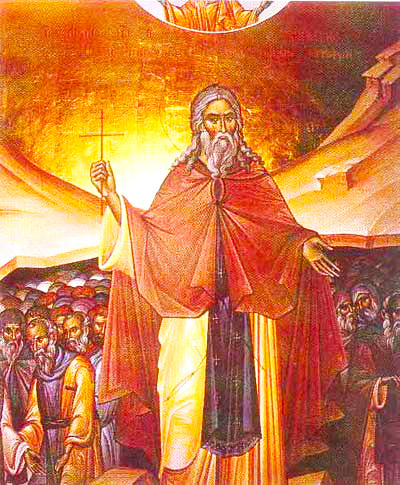
The Monk John the Perspicacious of Egypt was born at the beginning of the IV Century. He lived in the city of Likopolis (Middle Egypt) and was a carpenter. At the age of twenty-five he went off to a monastery, where he accepted monastic tonsure. Over the course of twenty-five years the Monk John asceticised at various monasteries, and then wanting complete solitude, he withdrew into the Thebaid onto Mount Bolcha. Saint John then spent twenty-five years in solitude, never leaving the spot. He conversed with people coming to him through a small aperture, through which he also accepted frugal amounts of food brought him. The Monk John already after thirty years in seclusion was granted by God the graced gift of perspicacious foresight. Thus, he predicted to the emperor Theodosius the Great (379-395) the victory over his adversaries Maximus and Eugenius, and a military victory over the Gauls. For many visiting him he foretold events in their lives and gave them guidance. The holy ascetic distributed blessed oil to the sick visiting him, and anointing with it he healed them from various illness.
The Monk John predicted to the monk Palladios, who wrote down his life, that he would become a bishop. The prediction of the seer was fulfilled, and Palladios was made bishop of Bithynia (Asia Minor).
The Monk John in his directives commanded first of all to have humility: "Imitate in the measure of your strength the virtuous life of the holy fathers and, if ye fulfill everything, then hope not upon yourself nor praise yourself. For there are many such people, which, having reached perfection in virtue and becoming puffed up with pride, plunge from the heights into the abyss. Observe carefully: is your prayer fervent? your purity of heart not transgressed? your mind undisturbed by extraneous thoughts during time of prayer? observe, do you reject the world with all your soul? or go about to spy out the virtues of others, in vain then with your own particular virtues? Are ye concerned to put forth your good example before other people? Take heed, art ye become conceited in your own righteousness, puffed up with pride somehow by your good deed? Take heed, that during time of prayer thoughts about worldly things do not enter your head, since there is nothing more silly, than to converse with the lips to God, while in thought to be far off from Him. This often happens with those, which not so much renounce the world, as rather that they are concerned to comply with the world. A man, thinking about many things, is given over to cares about things worldly and perishable, but being subjected to concern about things worldly, a man cannot yet with his spiritual eyes behold God. For a man, meditating always about God, extraneous thoughts ought to be all in vain. For this man, who has attained to a certain knowledge of God (full knowledge of God no one can attain to), the mysteries of God are revealed to him, and he sees the future as the present, and like a saint he works miracles and receives through his prayer everything that he beseeches of God...
Love silence, child, dwelling always in Divine-meditation and praying God always, that He grant you a pure mind, free from sinful thoughts. Worthy of praise certainly is that ascetic who, living in the world, practises the virtues, rendering kindliness to strangers or distributing alms, or aiding in the work of others, or dwelling constantly without anger. Such a man is praiseworthy, since he dwelleth in virtue, fulfilling the commands of God, while yet not leaving off from earthly affairs. But better than this and more worthy of praise would be that one who, dwelling constantly in Divine-meditation, would ascend from the corporeal to the incorporeal, letting go of the care and concern of others, himself striving towards the Heavenly, constantly standing before God, having relinquished everything worldly and being not still attached to the world by earthly cares. Such a man is in proximity to God, Whom he doth glorify in prayers and psalmody".
With these and similar salvific instructions, and with directive discourse and example of like-angelic life, the monk brought much spiritual benefit to people.
The Monk John of Egypt survived into old age and expired to the Lord in the year 395, at the age of ninety.
© 1996-2001 by translator Fr. S. Janos.


Isaiah 29:13-23
13 Therefore the Lord said: “Inasmuch as these people draw near with their mouths And honor Me with their lips, But have removed their hearts far from Me, And their fear toward Me is taught by the commandment of men,
14 Therefore, behold, I will again do a marvelous work Among this people, A marvelous work and a wonder; For the wisdom of their wise men shall perish, And the understanding of their prudent men shall be hidden.”
15 Woe to those who seek deep to hide their counsel far from the Lord, And their works are in the dark; They say, “Who sees us?” and, “Who knows us?”
16 Surely you have things turned around! Shall the potter be esteemed as the clay; For shall the thing made say of him who made it, “He did not make me”? Or shall the thing formed say of him who formed it, “He has no understanding”?
17 Is it not yet a very little while Till Lebanon shall be turned into a fruitful field, And the fruitful field be esteemed as a forest?
18 In that day the deaf shall hear the words of the book, And the eyes of the blind shall see out of obscurity and out of darkness.
19 The humble also shall increase their joy in the Lord, And the poor among men shall rejoice In the Holy One of Israel.
20 For the terrible one is brought to nothing, The scornful one is consumed, And all who watch for iniquity are cut off—
21 Who make a man an offender by a word, And lay a snare for him who reproves in the gate, And turn aside the just by empty words.
22 Therefore thus says the Lord, who redeemed Abraham, concerning the house of Jacob: “Jacob shall not now be ashamed, Nor shall his face now grow pale;
23 But when he sees his children, The work of My hands, in his midst, They will hallow My name, And hallow the Holy One of Jacob, And fear the God of Israel.
Proverbs 14:15-26
15The simple believes every word, But the prudent considers well his steps.
16 A wise man fears and departs from evil, But a fool rages and is self-confident.
17 A quick-tempered man acts foolishly, And a man of wicked intentions is hated.
18 The simple inherit folly, But the prudent are crowned with knowledge.
19 The evil will bow before the good, And the wicked at the gates of the righteous.
20 The poor man is hated even by his own neighbor, But the rich has many friends.
21 He who despises his neighbor sins;
22 Do they not go astray who devise evil? But mercy and truth belong to those who devise good.
23 In all labor there is profit, But idle chatter leads only to poverty.
24 The crown of the wise is their riches, But the foolishness of fools is folly.
25 A true witness delivers souls, But a deceitful witness speaks lies.
26 In the fear of the Lord there is strong confidence, And His children will have a place of refuge.
#orthodoxy#orthodoxchristianity#ancientchristianity#originofchristianity#spirituality#sacredtexts#oldtestament#wisdom
6 notes
·
View notes
Text
Holidays 8.23
Holidays
Battle of Kursk Day (Russia)
Black Ribbon Day (Baltic states)
Daffodil Day [also 4th Friday]
European Day of Remembrance for Victims of Stalinism and Nazism (EU)
Find Your Inner Nerd Day
Flag Day (Ukraine)
Gai Jatra (Cow Festival; Kathmandu Valley, Nepal)
Goldfinch Day
Health Unit Coordinator Day
Hug Your Sweetheart Day
International Day For the Remembrance of the Slave Trade and its Abolition (UN)
Internaut Day
Liberation from Fascist Occupation Day (Romania)
National Cheap Flight Day
National Physicians Day (Iran)
National Plumber's Day
National Sneak Off to the Beach Day
One-Way Street Day
Permanent Press Day
Ride the Wind Day
Sacco-Vanzetti Memorial Day
Schueberfouer Shepherd’s Fair begins (Luxembourg)
Umhlanda Day (Eswatini, f.k.a. Swaziland)
Valentino Day
Food & Drink Celebrations
Buttered Corn Day
Cuban Sandwich Day
National Spongecake Day
Feast Days
Appollinaris Sidnonius, Bishop of Clermont (Christian; Saint)
Appreciate What You’ve Got Day (Pastafarian)
Ascelina (Christian; Saint)
Asterius, Claudius, Domnina, Neon, and Theonilla (Christian; Martyrs)
Day of Nemesea (Old Roman Goddess Nemesis, defender of the relics & memory of the dead from insults)
Dollond (Positivist; Saint)
Éogan of Ardstraw (Christian; Saint)
Eugenius of Ireland (Christian; Saint)
Gaura Parba (Women’s Festival to Goddess Gauri; Nepal)
Great Feast of the Netjeru (All Gods/Goddesses; Ancient Egypt)
Hammer Fraggle (Muppetism)
Janmashtami (Lord Krishna Nativity; Hindu)
Justinian the Hermit (Christian; Saint)
Kirvis (Harvest Festival; Lithuania)
Lupus (a.k.a. Luppus) of Novae (Christian; Saint)
Nemeseia (Ancient Greece)
Nuclear Accident Day (Church of the SubGenius)
Philip Benitius (Christian; Saint)
Quiriacus and companions, of Ostia (Christian; Saint)
Rose of Lima (Christian; Saint)
Theonas, Archbishop of Alexandria (Christian; Saint)
Tydfil (Christian; Saint)
Vertumnalia (Old Roman God of the Change of Seasons)
Virgo zodiac sign begins
Vulcanalia (Ancient Roman festival to Vulcan)
Zacchaeus of Jerusalem (Christian; Saint)
Lucky & Unlucky Days
Tomobiki (友引 Japan) [Good luck all day, except at noon.]
Premieres
Animal Crackers (Film; 1930)
Better Off Dead (Film; 1985)
The Big Sleep (Film; 1946)
Cherry Pink and Apple Blossom White, recorded Perez Prado (Song; 1954)
Henry IV, Part 2, by William Shakespeare (Play; 1600)
She’s the One (Film; 1996)
That ’70s Show (TV Series; 1998)
The World’s End (Film; 2013)
Today’s Name Days
Philipp, Rosa (Austria)
Rozalija, Ruža, Ružica (Croatia)
Sandra (Czech Republic)
Zakæus (Denmark)
Signe, Singe (Estonia)
Signe, Varma (Finland)
Rose (France)
Isolde, Rosa, Zachäus (Germany)
Bence (Hungary)
Fabrizio, Maria, Regina (Italy)
Benjamins, Ralfs, Spriditis, Vitālijs (Latvia)
Girmantas, Pilypas, Tautgailė (Lithuania)
Signe, Signy (Norway)
Apolinary, Benicjusz, Filip, Laurenty, Sulirad, Walerian, Waleriana, Zacheusz (Poland)
Filip (Slovakia)
Rosa (Spain)
Signe, Signhild (Sweden)
Eugene, Eugenia, Geena, Gena, Gene, Genie, Gina, Jina, River, Zacchaeus, Zaccheus (USA)
Today is Also…
Day of Year: Day 235 of 2022; 130 days remaining in the year
ISO: Day 2 of week 34 of 2022
Celtic Tree Calendar: Coll (Hazel) [Day 18 of 28]
Chinese: Month 7 (Lányuè), Day 26 (Wu-Shen)
Chinese Year of the: Tiger (until January 22, 2023)
Hebrew: 26 Av 5782
Islamic: 25 Muharram 1444
J Cal: 25 Hasa; Threesday [25 of 30]
Julian: 10 August 2022
Moon: 12% Waning Crescent
Positivist: 11 Gutenberg (9th Month) [Dollond]
Runic Half Month: As (Gods) [Day 13 of 15]
Season: Summer (Day 64 of 90)
Zodiac: Virgo (Day 1 of 31)
Calendar Changes
Virgo (The Virgin) begins [Zodiac Sign 6; thru 9.22]
0 notes
Text
Holidays 8.23
Holidays
Battle of Kursk Day (Russia)
Black Ribbon Day (Baltic states)
Daffodil Day [also 4th Friday]
European Day of Remembrance for Victims of Stalinism and Nazism (EU)
Find Your Inner Nerd Day
Flag Day (Ukraine)
Gai Jatra (Cow Festival; Kathmandu Valley, Nepal)
Goldfinch Day
Health Unit Coordinator Day
Hug Your Sweetheart Day
International Day For the Remembrance of the Slave Trade and its Abolition (UN)
Internaut Day
Liberation from Fascist Occupation Day (Romania)
National Cheap Flight Day
National Physicians Day (Iran)
National Plumber's Day
National Sneak Off to the Beach Day
One-Way Street Day
Permanent Press Day
Ride the Wind Day
Sacco-Vanzetti Memorial Day
Schueberfouer Shepherd’s Fair begins (Luxembourg)
Umhlanda Day (Eswatini, f.k.a. Swaziland)
Valentino Day
Food & Drink Celebrations
Buttered Corn Day
Cuban Sandwich Day
National Spongecake Day
Feast Days
Appollinaris Sidnonius, Bishop of Clermont (Christian; Saint)
Appreciate What You’ve Got Day (Pastafarian)
Ascelina (Christian; Saint)
Asterius, Claudius, Domnina, Neon, and Theonilla (Christian; Martyrs)
Day of Nemesea (Old Roman Goddess Nemesis, defender of the relics & memory of the dead from insults)
Dollond (Positivist; Saint)
Éogan of Ardstraw (Christian; Saint)
Eugenius of Ireland (Christian; Saint)
Gaura Parba (Women’s Festival to Goddess Gauri; Nepal)
Great Feast of the Netjeru (All Gods/Goddesses; Ancient Egypt)
Hammer Fraggle (Muppetism)
Janmashtami (Lord Krishna Nativity; Hindu)
Justinian the Hermit (Christian; Saint)
Kirvis (Harvest Festival; Lithuania)
Lupus (a.k.a. Luppus) of Novae (Christian; Saint)
Nemeseia (Ancient Greece)
Nuclear Accident Day (Church of the SubGenius)
Philip Benitius (Christian; Saint)
Quiriacus and companions, of Ostia (Christian; Saint)
Rose of Lima (Christian; Saint)
Theonas, Archbishop of Alexandria (Christian; Saint)
Tydfil (Christian; Saint)
Vertumnalia (Old Roman God of the Change of Seasons)
Virgo zodiac sign begins
Vulcanalia (Ancient Roman festival to Vulcan)
Zacchaeus of Jerusalem (Christian; Saint)
Lucky & Unlucky Days
Tomobiki (友引 Japan) [Good luck all day, except at noon.]
Premieres
Animal Crackers (Film; 1930)
Better Off Dead (Film; 1985)
The Big Sleep (Film; 1946)
Cherry Pink and Apple Blossom White, recorded Perez Prado (Song; 1954)
Henry IV, Part 2, by William Shakespeare (Play; 1600)
She’s the One (Film; 1996)
That ’70s Show (TV Series; 1998)
The World’s End (Film; 2013)
Today’s Name Days
Philipp, Rosa (Austria)
Rozalija, Ruža, Ružica (Croatia)
Sandra (Czech Republic)
Zakæus (Denmark)
Signe, Singe (Estonia)
Signe, Varma (Finland)
Rose (France)
Isolde, Rosa, Zachäus (Germany)
Bence (Hungary)
Fabrizio, Maria, Regina (Italy)
Benjamins, Ralfs, Spriditis, Vitālijs (Latvia)
Girmantas, Pilypas, Tautgailė (Lithuania)
Signe, Signy (Norway)
Apolinary, Benicjusz, Filip, Laurenty, Sulirad, Walerian, Waleriana, Zacheusz (Poland)
Filip (Slovakia)
Rosa (Spain)
Signe, Signhild (Sweden)
Eugene, Eugenia, Geena, Gena, Gene, Genie, Gina, Jina, River, Zacchaeus, Zaccheus (USA)
Today is Also…
Day of Year: Day 235 of 2022; 130 days remaining in the year
ISO: Day 2 of week 34 of 2022
Celtic Tree Calendar: Coll (Hazel) [Day 18 of 28]
Chinese: Month 7 (Lányuè), Day 26 (Wu-Shen)
Chinese Year of the: Tiger (until January 22, 2023)
Hebrew: 26 Av 5782
Islamic: 25 Muharram 1444
J Cal: 25 Hasa; Threesday [25 of 30]
Julian: 10 August 2022
Moon: 12% Waning Crescent
Positivist: 11 Gutenberg (9th Month) [Dollond]
Runic Half Month: As (Gods) [Day 13 of 15]
Season: Summer (Day 64 of 90)
Zodiac: Virgo (Day 1 of 31)
Calendar Changes
Virgo (The Virgin) begins [Zodiac Sign 6; thru 9.22]
0 notes
Photo
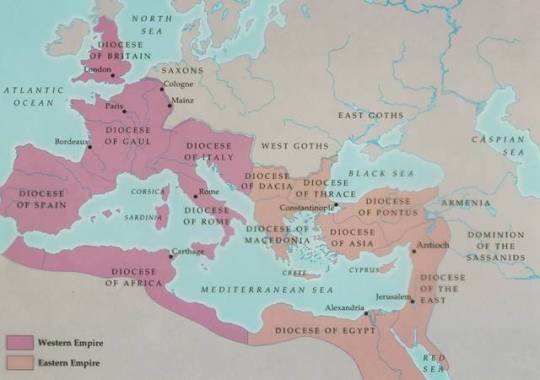
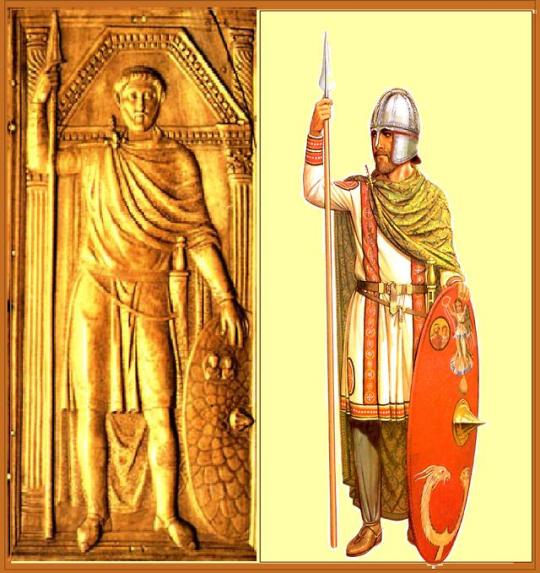
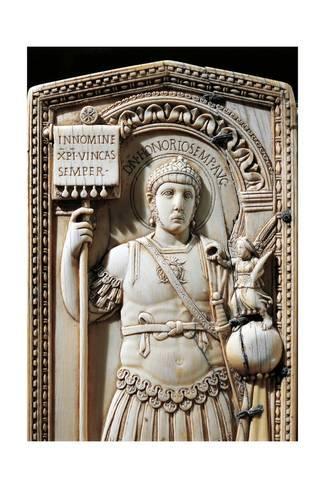
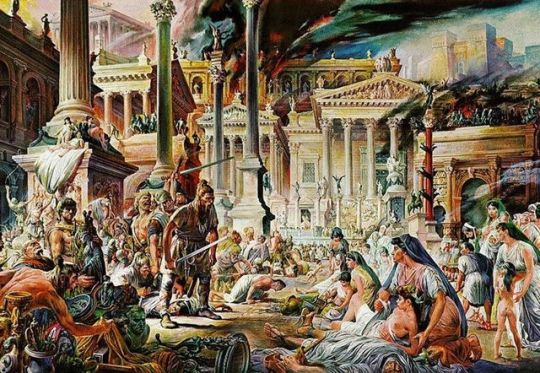
The Evolution of the Roman Empire Part VII --- Stilicho, Honorius, and the Destruction of the Roman Army
In case you missed: Part I, II, III, IV, V, VI
In the last post I made the assertion that throughout and up to the late 4th century the Roman Army was very strong, and that despite the fact that the Western Roman Empire was on a sharp decline, the state scrapped up enough cash and resources to make sure that the army stayed that way. In the period between around 388 and 410 a series of events would occur that would bring about the downfall of the Western Roman Army as well as the Western Empire. Before I begin I want to give warning; the events I am writing about are extremely complex and very detailed. For brevity’s sake I am going to be leaving out a lot of details. Whole books have been written about this time period in Roman history. I myself could do an eight parts series on this time period alone. However I will do the best that I can to keep things short, simple, and cover most of the major points.
At around 383 AD Rome was divided into two subdivisions. In the eastern half ruled Theodosius I, who was officially emperor of the entire empire, but de facto ruler of only the eastern empire. In the west the empire was co-ruled by two emperors, Gratian and Valentinian II. In that year a Roman general named Magnus Maximus rebelled against Rome, murdered Gratian, and declared himself emperor. In 388 Maximus marched on Italy and attempted to remove Valentianian II, making himself sole emperor of the west. However, Theodosius intervened and defeated Maximus’ army at the Battle of the Save. In 392 a Frankish/Roman general named Arbogast murdered Valentinian II and installed a Roman minister named Eugenius as emperor. Once against Theodosius intervened, and with an army of 20,000 Goths and 20,000 Eastern Roman soldiers defeated a similar sized Western Roman Army at the Battle of the Frigidius. While there are no records of the casualties resulting from these civil wars, one thing that is clear is that the casualties were described as being extremely heavy. Rome had suffered disastrous casualties before, such as the Battle of Cannae and the Battle of Arausio where in each near 80,000 Roman soldiers were massacred in a matter of hours. However, at this point in history the Roman Empire was suffering a sharp decline, a far cry from the empire of the Roman golden ages. Generations of incompetent leadership, rampant government corruption, and near constant civil war had taken it’s toll, leaving the empire with a depressed economy and a severe lack of resources. Suddenly, in the span of 4 years, the mighty Western Roman Army was reduced by a large fraction, and the empire had not the means to replace these losses.
Theodosius I died in 395, being the last emperor to rule over a united Roman Empire. After his death, his two sons inherited the empire, Honorius in the West, and Arcadius in the East.
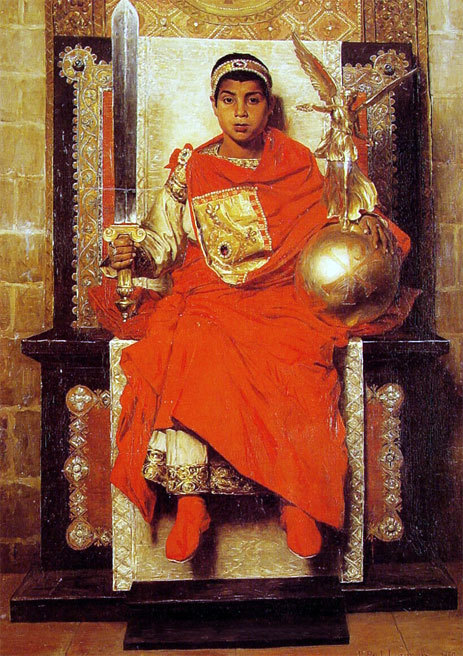
When Honorius ascended to the throne he was but a young child, thus de facto rule of the empire fell upon his guardian, a Roman general of Vandal birth named Flavius Stilicho. Known now as one of the greatest generals in Roman history, Stilicho would come to power at a time when all hell was about to be unleashed upon the empire.
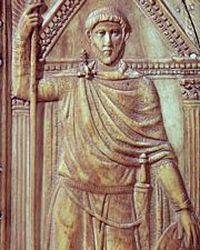
Between the years 395 to 397 he put down a Visigoth revolt lead by King Alaric. Then in later 397 the Roman governor of North Africa, a general named Gildo, revolted against the empire and cut off the grain supply to Rome. This revolt was quashed just in time for the Picts to start up trouble along the northern border of Britain along Hadrian’s Wall. In 402 Alaric once again tried his hand at conquest by invading Italy and even laying siege to the Roman capital in Ravenna, once again Stilicho defeated him in battle. Alaric agreed to foederati status and promised military aid in the future. In 406 a massive barbarian invasion consisting of Alans, Sueves, and Vandals led by a Gothic king named Radagaisus invaded Italy, but once again were defeated by Stilicho.
In order to build an army capable of dealing with so many crises, Stilicho was forced to recall legions from around the empire, especially near the border regions. In addition Stilicho filled the ranks of his army with barbarian recruits as well as foederati units. For example, in his campaign against Radagaisus, Stilicho’s army consisted of an odd mixture of Roman regulars as well as foederati Goths, Vandals, Huns, and Alans. As a result of Stilicho siphoning units away from the provinces,many parts of the empire were left undefended and the border along the Rhine and Danube was undermanned, allowing more barbarians to storm into Gaul (France). In response, the Governor of Britain, fed up with the empire’s inability to deal with the barbarians, would proclaim himself emperor, and moved all of his forces to Gaul. Stilicho would try to put down this revolt, but was unsuccessful. As a compromise, the British governor was made co-emperor, taking the name Constantine III. This was good enough for Stilicho, the last thing Rome needed was a civil war, and Constantine III could handle the barbarians in Gaul.
After twelve years of shit hitting the fan, the empire still stood,all thanks to Stilicho. Despite seeing the empire through one crises after another, you would think that the Roman state would be kissing his feet. In reality, Stilicho had made a number of enemies, many of whom were ministers to the young emperor Honorius. They filled Honorius with rumors; that Stilicho planned to overthrow and replace Honorius, that the Vandal descended general had plans to sell out the empire to the barbarians, that Stilicho was a modern day Julius Caesar. As a result, Honorius ordered the death of Stilicho, and ordered a purging of pro-Stilicho elements in the government and army. On August 22nd, 408 Stilicho was captured and beheaded.
With the death of Stilicho it was now up to Honorius and his regime to perform the juggling act that was managing the empire. Honorius was 24 years old. I know when I was 24 years old I was certainly not cut out to rule an empire in crises. Rome has had its share of incompetent, evil, and downright batshit crazy emperors, however by the reign of Honorius, Roman emperors were spoiled brats who spent most of their time cloistered in their palaces, drinking wine and playing backgammon, with no knowledge of how the real world worked. Honorius is particularly noted for being a dimwit. Fortunately for Honorius there was only one requirement he needed to fulfill and all would be well; DON’T PISS OFF THE BARBARIANS!!! By 408 a large percentage of the Roman Army was made up of barbarian recruits and was further reliant on foederati units. As I mentioned in the previous post, barbarians of the 5th century were not the raging hordes of popular imagination, but were well armed, well trained, and well organized professional armies manned by many veterans of the Roman Army. Also, unlike popular imagination, most barbarians were not out to conquer or destroy the empire, at least initially. Rather, most barbarians hoped to become a part of the empire, serving as full fledged Roman citizens.
Stilicho was able to recruit the support of so many foederati by playing into these desires, promising that loyal tribes who completed an honorable term of service to the empire would be settled on a plot of land, given a stipend of grain until they became self sufficient, and eventually would be granted Roman citizenship. When Honorius came to power, he declared that all of Stilicho's previous deals were off. As a result, most foederati deserted the Roman Army. Finally, one of Honorius' ministers, a man named Olympius who was famous for orchestrating the death of Stilicho, declared that barbarians were no longer fit to live in Italy. Across Italy Imperial soldiers went from town to town, city to city, and rounded up thousands of barbarian men, women, elderly, and children, putting them to the sword. In response, Alaric and his Goths again revolted against the empire. Around 30,000 barbarian soldiers in the regular Roman Army would desert and join his cause along with thousands of barbarian refugees.

The timing for this was bad for Honorius, as Constantine III had sent his army to invade Italy in an attempt to make himself sole emperor. Most loyal troops were away dealing with Constantine when Alaric and his army invaded Italy.
In 408 Alaric laid siege to Rome, sending a message to the Roman Senate that it was time to renegotiate their deal. The Senate agreed, paying a sum of gold, silver, and clothing to the Goths as a sign of good faith as well as freeing 40,000 Goth slaves. However, Honorius intervened and declared that they would make no deals with the barbarians. Alaric laid siege to Rome again, and once again the Senate declared they were willing to make a deal. Again Honorius intervened saying "no deal!" Alaric laid siege to Rome a third time, this time sweetening the pot by offering to be settled along the Danube, where Gothic men would be enrolled in the Roman Army and would take responsibility for guarding the border. The Senate were practically jumping from their seats shouting, "yes! YES! WE WILL TAKE THAT DEAL!!!". For some reason Honorius didn't quite understand that when negotiating it helps to have some leverage on your side, especially when your demands are unconditional. If leverage could be measure on a scale from 1-10, Alaric would have a 10, Honorius would have a zero. Honorius once again declared that there would be no deal, sending small detachments of Roman soldiers, which Alaric’s army would easily ambush and destroy. In 410 AD Alaric and his Goths sacked Rome. The Goths looted the city and when satiated with enough plunder, moved north and settled in Gaul (France). Honorius was damned lucky they didn't make a stop at Ravenna while on their way and claim his head as well. At the time, the only defenses available to Honorius were his palace guards.
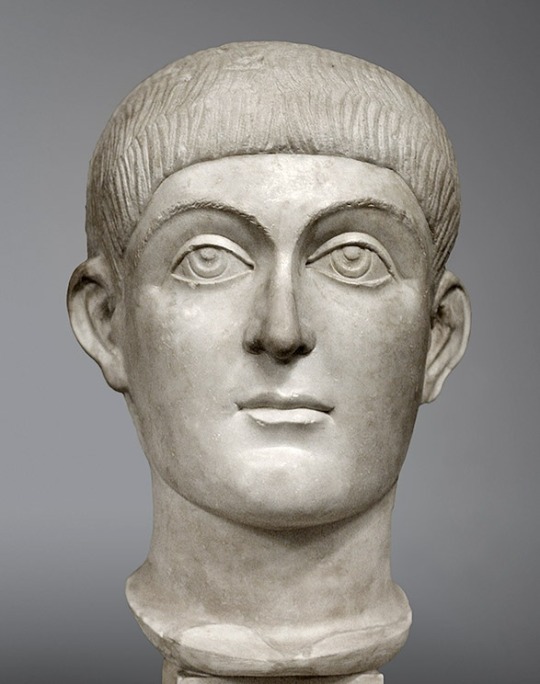
So what happened to the Roman Army between the years 388 and 410?Needless to say, the army was devastated by theses series of crises. Several clues can be inferred by a document called the "Notitia Dignitatum", which was a registry of government offices throughout the empire. In addition, the book lists all military units, where they are stationed, and who commanded them. Published periodically, the last known surviving example from the Western Empire dates to 420 AD. After the sack of Rome, Constantius III (not to be confused with Constantine III) a general and co-emperor of Honorius would attempt to rebuild the Roman Army. In an analysis of the Notitia Dignatatum published in 390 and the one published in 420, the historian A. H. M Jones details the damage that had been done to the army and the measures Constantius III had attempted to rebuild it. According to Jones in his three volume book "The Later Roman Empire” ( available to read for free at archive.org), of the 181 comitatense legions that existed in 390, only 89 were still in existence by 420. This means that around 50% of Rome's field army was destroyed (at the time a legion consisted of 1,000 men). Constantius III had managed to rebuild the army back to its 181 legions, however, the Roman Army was most likely only strong on paper. Of the 92 destroyed legions, only 21 replacement legions were created from new recruits. The rest were created by limitanei units that were promoted to comitatus status (Later Roman Empire, Vol 1, P. 196). Recall that limitanei units were not regular field army units. Their purpose was to guard the border, deal with small scale raids, and sound the alarm if a large invasion was on its way. They were light infantry reconnaissance units, guerrilla fighters, and part time militia, not front line combat heavy infantry. This poses the problem in that with less limitanei, there were now less men guarding the borders. In addition, most likely these men were not retrained and re-equipped to be comitatus units. Finally the Notitia Dignatatum does not give unit sizes, and it would not be unreasonable to assume that many of the units listed were undermanned and underequipped. BTW, the Notitia did have illustrations of the shield markings of different legions, which is pretty cool.
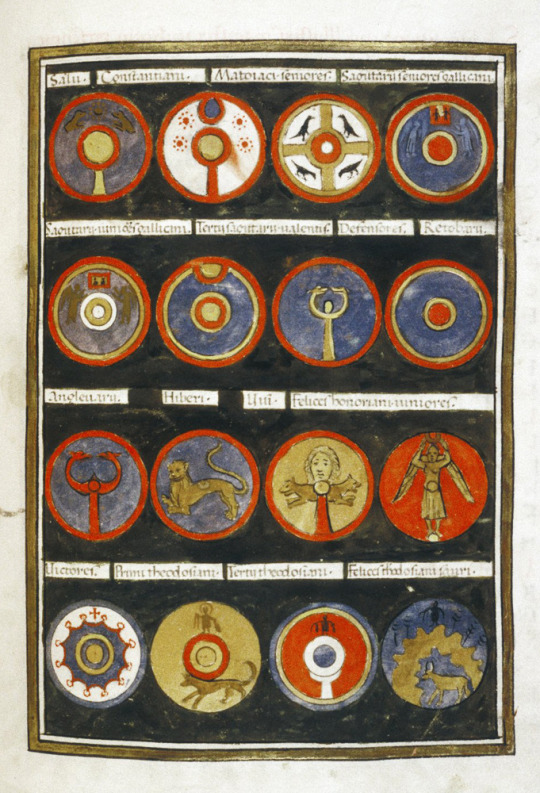
Based on this information, most likely it can be assumed that the Roman Army was a shell of it's formal glory. In the eighth and final installment of this series, what remains of the Roman Army will be whittled away to nothing, and finally Rome will cease to be.
At least it will in the West. If anyone would like to pick up where I left off and do a series on the Byzantine Army, please please please let me know.
#history#ancient history#ancient rome#roman army#western roman empire#military history#honorius#stilicho#goths#alaric
797 notes
·
View notes
Photo


Francesco became duke of Milan in 1450 and showed he was as able a statesman and ruler as he was a military commander. His marriage to Bianca Maria Visconti helped the people of the duchy to accept the Sforzas as legitimate dukes of Milan, and he made effective use of his skilled and devoted officials to impose his authority. With his ally Cosimo de’ Medici of Florence, he played an important role in developing a more stable system of relations between the states of Italy.
Renaissance and Reformation, James Patrick.
Even more spectacularly successful, and by a wide margin the most feared, was Francesco Sforza. Though not born into a ruling family, he gained admittance to the brotherhood of condottieri while still half-grown by virtue of being the son of one of the leading mercenary commanders of the early 1400s, Muzio Attendolo. In the course of his own impressive career, as a kind of early experiment in branding, this Attendolo had given himself the name Sforza, meaning “force.” Francesco, twenty-three when his father drowned crossing a river during one of their campaigns, took charge of the family business and soon showed himself to be a general of immense courage and rare ability. In the manner of his profession he changed sides whenever it was advantageous to do so, first fighting against Pope Eugenius IV and then contracting to work for him. Later, in the service of Venice, he inflicted a painful defeat on Milan, after which he married the sixteen-year-old only child of Milan’s ruler, the last Visconti duke. When his father-in-law died, Francesco laid claim to the ducal title. To win it he had to fend off challenges from the German emperor (whose fiefdom Milan was), the French duke of Orléans (whose mother was a Visconti), and the military might of Venice. In succeeding he became the only condottiere to found a ruling dynasty.
G.J Meyer, The Borgias: The Hidden History.
The people of Milan, divided, isolated and hungry, were no match for the forces of Francesco Sforza. By the time he reached the outskirts of the city in February 1450, he had already conquered many of the former Visconti possessions, at first in the service of the Milanese themselves, and then on his own behalf. When he entered Milan on 26 February, a new regime began. At first Francesco was mainly occupied with winning acceptance within the Visconti territories and dealing with the Venetians. His aim was to re-establish control over Bergamo and Brescia, as well as Verona and Vicenza. He still had the support of Florence, but Alfonso of Aragon, king of Naples, intent on expanding northwards had broken ranks, joining forces with Venice. War dragged on until 1453, when financial expediency and the capture of Constantinople provided all sides with the occasion for a settlement, Francesco Sforza being forced to cede Bergamo, Brescia, and Crema in the Peace of Lodi in 1454. In 1464, having helped the Genoese free themselves from the French, he was himself elected signore of Genoa. Within the duchy, the new duke was careful to demonstrate continuity with the government of Filippo Maria, reappointing Visconti officials to key positions and re-establishing the Consiglio Segreto and Consiglio di Giustizia. He was fortunate in having the able assistance of his wife Bianca Maria and of his secretary, Cicco Simonetta. By the time of his death on 8 March 1466, Francesco had achieved his main ambition: he had preserved the Visconti inheritance and made it mostly his own. On the other hand, he had signally failed to win the imperial recognition for which he had yearned.
Absolutism in Renaissance Milan: Plenitude of Power Under The Visconti and The Sforza, Jane Black.
#francesco sforza#anthony howell#perioddramaedit#imediciedit#medici: masters of florence#i medici#renaissance#milan#history#italian history#house sforza#my stuff#he might be the only sforza i find interesting#i like him a lot
69 notes
·
View notes